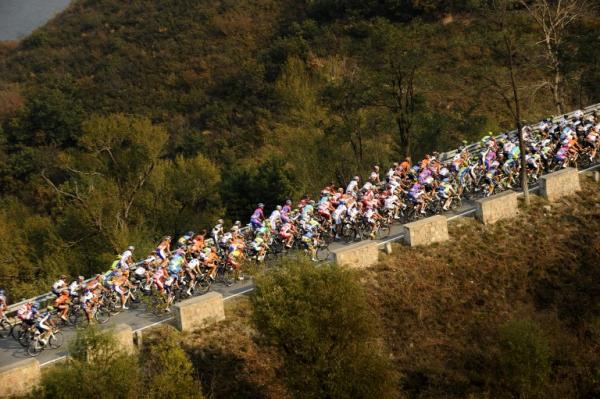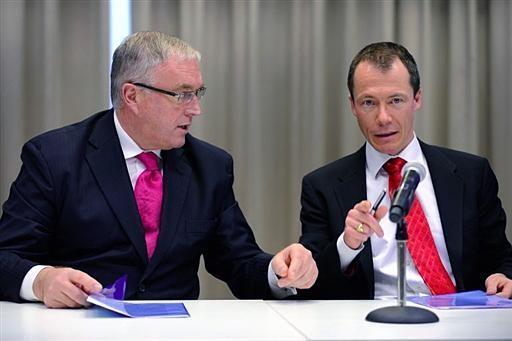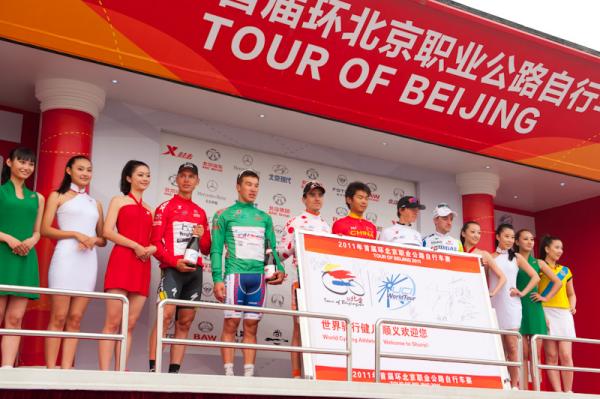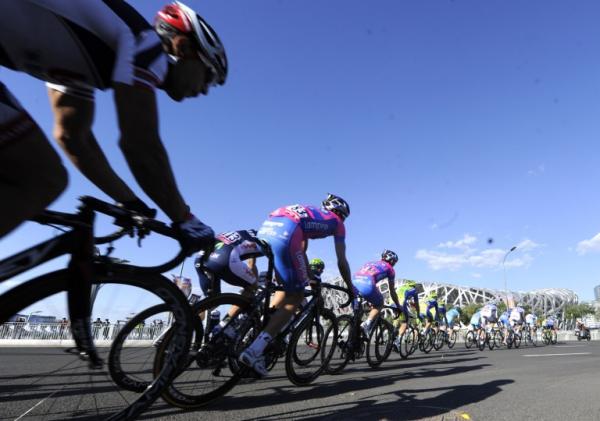Q & A: Global Cycling Promotion on Beijing and continental expansion
Exclusive interview with Alain Rumpf




Two-and-a-half years ago the UCI launched the Global Cycling Promotion (GCP), the arm of the governing body charged with the global promotion of cycling in a race organising capacity.
Q & A: Global Cycling Promotion on Beijing and the way forward
UCI looking for investors for GCP
Season-ending Tour of Hangzhou added to WorldTour calendar
Tour of Hangzou poised to enter WorldTour
Tour of Hangzhou joins WorldTour for four years
UCI postpones Tour of Hangzhou
UCI freezes Hangzhou WorldTour project, moves Tour of Beijing
In late 2011 the inaugural Tour of Beijing was rolled out and although the event is now heading into its third year, GCP has so far failed to launch a second event.
Struggling to make a profit and with no new races yet signed off for 2014, Alain Rumpf sat down with Cyclingnews for an exclusive interview.
CN: Can we start with the Tour of Beijing and can you provide an update on where the 2013 race currently stands?
AR: With the Tour of Beijing we’re in the real operational phase of this year’s race. We’ve announced the course and we’re quite happy with it. We’ve spent three years driving around Beijing and scouting routes and the first two editions were quite good from a route point of view, but we’re really happy with this year’s route. We go back to some of the traditional route with stage 5 racing between Tiananmen Square and the Olympic Park but we also have this new summit finish. It’s the first time we’ve had a summit finish in the race and we hope it will provide some exciting racing.
CN: There was a press release last week that said the Tour of Beijing was the fourth most-watched race in the world. With no disrespect it’s certainly not the fourth most-popular or biggest in terms of prestige or interest, so how did you arrive at those figures?
AR: It’s certainly a young race so from that point of view there are many other races on the WorldTour calendar that can be considered more prestigious and more traditional but these figures are in terms of cumulative audience. If you add all the viewers via live, delayed, summaries, highlights and news this comes from two elements; the fact that the race is broadcast on five continents but of course China being a big country the race is shown on the number one state-owned television channel. This makes a big difference. That’s really good news because it means that this race has brought cycling to a new audience it did not have before.
Get The Leadout Newsletter
The latest race content, interviews, features, reviews and expert buying guides, direct to your inbox!
CN: But are the figures down to how many people are actually watching or just how many people who have the opportunity to watch the race?
AR: No, these are actual viewers. Every year the UCI is working with Repucom to get surveys on the television exposure of the UCI WorldTour events. Every team and every organiser receives this report and these are actual viewing figures, the number of people who have seen the race.
CN: How lucrative is the race for you? Is it the fourth richest race in the world?
AR: From the team point of view I don’t want to use the word lucrative but certainly the participation fee that the teams get is pretty good. The prize money which is $400,000 is good compared to other UCI WorldTour races. So from that point of view the race is bringing added value to its key stakeholders, the teams and the riders and that’s the mission. That’s why we’re there, to bring added value and to make sure it’s redistributed in a fair manner.
CN: When we talked in 2011 you said that you’d be in a better position later on to say how much the race actually costs to run? Can you confirm the cost now?
AR: No. The way we work, the budget in our partnership with the city of Beijing, the budget is managed and covered by the city. They are in charge of the race and the fixed budget. We do not know the actual total budget for the event. What we control, prize money, the participation fee for the teams, that we know, but the overall budget we don’t know that. I don’t know the cost myself.
CN: Can you tell me what profit GCP returns each year?
AR: I’d ask you to refer to the annual UCI reports. GCP itself is not there to make profit. It’s there to execute projects like the Tour of Beijing, make sure the stakeholders are given a fair share and any profit that is made is transferred back to the UCI.
CN: So what did you return to the UCI last year for the race?
AR: I’m not here to comment on these elements. This is a UCI responsibility but what I can say is that last year as you may remember we started working on the Tour of Hangzhou but that didn’t happen. It shows the risky nature of trying to globalise the sport and create new projects around the world. Sometimes it works, sometimes it doesn’t. Sometimes it makes profit but sometime you have to invest and don’t make a return so GCP should not be seen as a money making instrument. GCP are there to develop the sport in the interest of the stakeholders. It’s there to make progress.
CN: Well the figures show that GCP made a net loss of 171,000 CHF in 2011. How do you explain that and when can you see GCP turning a profit?
AR: If you look at the UCI financial report you see that the loss was CHF 6,000 CHF: in 2011, GCP used the last portion (CHF 165,000) of the grant awarded in 2009 by the UCI ProTour Council from the UCI ProTour reserve fund to launch the GCP project. From 2012, GCP had to do without this and find other ways of balancing its budget. But it shows what GCP is about: to create and redistribute value to the cycling family, not to make a profit.
CN: What happened with Hangzhou and also plans for India, Brazil and Russia?
AR: We’re still working on lots of projects at the moment. It’s like any business you make 100 contacts, you have serious discussions with maybe ten of those and then at the end of the day you will end up realising one of these ten. We’re typically in that situation. There are lots and lots of opportunities around the world for our sport because cycling is healthy, it’s green and lots of governments at regional and national level they do want to promote the bike. We’re working with these entities to help them and bring them our expertise. Let's not forget that the Tour of Beijing is there because the city of Beijing wants to promote the bike as a healthy means of transport.
I have to admit that Hangzhou was a painful experience. We invested a lot of time and effort in making this second race happen but not all the local stakeholders were aligned behind the project so it could not happen. Once it was decided that the race would not take part in 2012 we immediately started working on 2013 but very quickly we realised it would be difficult for this year too, so we decided not to go again. We will keep working on the project but without any timeline.
CN: when do you envisage there being another GCP race though, in 2014, 2015?
AR: It could be. We’d love to be able to bring another race into the WorldTour of the same size as Beijing and being able to grow an event like that. There are opportunities around the world pending the UCI’s review of the WorldTour calendar there will probably be slots on the calendar that need new events at the WorldTour level. Having said that it’s not just about the WorldTour events and we’re trying to help develop events at the Continental level.
CN: Where will the next GCP race be?
AR: I’ll tell you when I sign the next contract. Hangzhou was a painful experience and we’ve learnt from it so I’m now very careful when talking about this subject. We have a lot of exciting prospects at the moment and I’m quite optimistic that some of them will be a reality.
AR: I won’t get into the details because I’m not here to blame anyone but the goal is still to have race in Hangzhou one day. It’s great terrain and a beautiful part of China. There’s a lot of people there who want the race to happen and they have a huge bike scheme there. However not all the local stakeholders were aligned and you need everyone to support a bike race and if you don’t have that support you have a problem.
CN: In the interest of GCP who do you think should be the next president of the UCI?
AR: I’m certainly not answering that question as that’s not my business to comment on this. There’s an ongoing process and there will be an election. The people with the responsibility to make the choice will make and we’ll go from there. My job isn’t to get involved.
CN: Both candidates have different manifestos relating to globalising the sport and GCP. You must be aware of that situation?
AR: Yes but above that you have the UCI’s constitution and the UCI’s mission to develop the sport and make it stronger around the world. Again, my job with GCP is to help that and then to work with whomever is in charge at the UCI to make that happen.
CN: Finally, would you see it as a failure if GCP didn’t launch a new race within the next two years?
AR: I’m not here to speak in terms of promises of new events until contracts have been signed. Again, there are lots of opportunities around the world and I’m confident that we’ll be able to bring more than the Tour of Beijing to cycling. There’s a lot of potential.
Daniel Benson was the Editor in Chief at Cyclingnews.com between 2008 and 2022. Based in the UK, he joined the Cyclingnews team in 2008 as the site's first UK-based Managing Editor. In that time, he reported on over a dozen editions of the Tour de France, several World Championships, the Tour Down Under, Spring Classics, and the London 2012 Olympic Games. With the help of the excellent editorial team, he ran the coverage on Cyclingnews and has interviewed leading figures in the sport including UCI Presidents and Tour de France winners.
